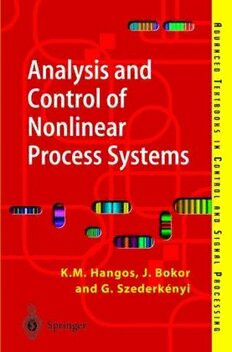
Analysis and control of nonlinear process systems PDF
Preview Analysis and control of nonlinear process systems
Analysis and Control of Nonlinear Process Systems K.M. Hangos J. Bokor G. Szederkényi Springer TLFeBook Advanced Textbooks in Control and Signal Processing Springer London Berlin Heidelberg NewYork HongKong Milan Paris Tokyo TLFeBook SeriesEditors ProfessorMichaelJ.Grimble,ProfessorofIndustrialSystemsandDirector ProfessorMichaelA.Johnson,ProfessorofControlSystemsandDeputyDirector IndustrialControlCentre,DepartmentofElectronicandElectricalEngineering, UniversityofStrathclyde,GrahamHillsBuilding,50GeorgeStreet,GlasgowG11QE,U.K. Othertitlespublishedinthisseries: GeneticAlgorithms:ConceptsandDesigns K.F.Man,K.S.TangandS.Kwong NeuralNetworksforModellingandControlofDynamicSystems M.Nørgaard,O.Ravn,N.K.PoulsenandL.K.Hansen ModellingandControlofRobotManipulators(2ndEdition) L.SciaviccoandB.Siciliano FaultDetectionandDiagnosisinIndustrialSystems L.H.Chiang,E.L.RussellandR.D.Braatz SoftComputing L.Fortuna,G.Rizzotto,M.Lavorgna,G.Nunnari,M.G.Xibiliaand R.Caponetto StatisticalSignalProcessing T.Chonavel TranslatedbyJanetOrmrod Discrete-timeStochasticSystems(2ndEdition) T.Söderström ParallelComputingforReal-timeSignalProcessingandControl M.O.Tokhi,M.A.HossainandM.H.Shaheed MultivariableControlSystems P.AlbertosandA.Sala ControlSystemswithInputandOutputConstraints A.H.GlattfelderandW.Schaufelberger ModelPredictiveControl(2ndedition) E.F.CamachoandC.Bordons PublicationdueApril2004 ActiveNoiseandVibrationControl M.O.Tokhi PublicationdueOctober2004 PrinciplesofAdaptiveFiltersandSelf-learningSystems A.Zaknich PublicationdueJune2005 TLFeBook K.M. Hangos, J. Bokor and G. Szederkényi Analysis and Control of Nonlinear Process Systems With42Figures 1 3 TLFeBook K.M.Hangos,PhD,DSci J.Bokor,PhD,DSci G.Szederkényi,PhD SystemsandControlLaboratory,ComputerandAutomationInstitute, HungarianAcademyofSciences,H-1516Budapest,POBox63,Kendeu.13-17, Hungary BritishLibraryCataloguinginPublicationData AcataloguerecordforthisbookisavailablefromtheBritishLibrary LibraryofCongressCataloging-in-PublicationData Hangos,K.M.(KatalinM.) Analysisandcontrolofnonlinearprocesssystems/K.M.Hangos,J.Bokor[sic],andG.Szederkényi. p.cm.--(Advancedtextbooksincontrolandsignalprocessing,ISSN1439-2232) ISBN1-85233-600-5(alk.Paper) 1.Processcontrol.2.Nonlinearcontroltheory.I.Bokor,J.József),1948-II. Szederkényi,G.(Gàbor),1975-III.Title.IV.Series. TS156.8.H342004 629.8'36-dc22 2003065306 Apartfromanyfairdealingforthepurposesofresearchorprivatestudy,orcriticismorreview,as permitted under the Copyright, Designs and Patents Act 1988, this publication may only be reproduced,storedortransmitted,inanyformorbyanymeans,withthepriorpermissioninwritingof thepublishers,orinthecaseofreprographicreproductioninaccordancewiththetermsoflicences issuedbytheCopyrightLicensingAgency. Enquiriesconcerningreproductionoutsidethoseterms shouldbesenttothepublishers. ISSN1439-2232 ISBN1-85233-600-5Springer-VerlagLondonBerlinHeidelberg amemberofBertelsmannSpringerScience+BusinessMediaGmbH springeronline.com ©Springer-VerlagLondonLimited2004 Theuseofregisterednames,trademarksetc.inthispublicationdoesnotimply,evenintheabsenceofa specificstatement,thatsuchnamesareexemptfromtherelevantlawsandregulationsandtherefore freeforgeneraluse. The publisher makes no representation, express or implied, with regard to the accuracy of the informationcontainedinthisbookandcannotacceptanylegalresponsibilityorliabilityforanyerrors oromissionsthatmaybemade. Typesetting:Electronictextfilespreparedbyauthors PrintedandboundintheUnitedStatesofAmerica 69/3830-543210 Printedonacid-freepaper SPIN10868248 TLFeBook For God had not given us the spirit of fear; but of power, and of love, and of a sound mind. II. Timothy 1.6 TLFeBook This page intentionally left blank TLFeBook Foreword Process systems constitute a key aspect of human activity that is closely linked to the three pillars of sustainable development: Economic competi- tiveness, Social importance (employment, quality of life) and Environmental impact. The future economic strength of societies will depend on the ability ofproductionindustriestoproducegoodsandservicesbycombiningcompet- itiveness with quality of life and environmental awareness. In the combined e(cid:11)ort to minimize waste through process integration and to optimally oper- atetheconstructedprocessesnonlinearbehavioursarebeingexploited.Thus there will be an increasing need for nonlinear process theory to systemati- cally deal with the relatively complex nonlinear issues that appear with the increasing process systems complexity dictated by our technological capabil- ity and the competitive demands. This book serves as a most promising source that combines process sys- tems engineering with nonlinear systems and control theory. This combina- tion is carried through in the book by providing the reader with references to linear time invariant control theory. The nonlinear passivity theory con- stitutes a particularly promising contribution that is illustrated on problems of relatively low dimensionality. The successful establishment of the state-of-art in nonlinear process sys- tems control in a concise textbook represents a laudable contribution to pro- cesssystemstheoryforthebene(cid:12)toffuturegraduatestudentsandresearchers and hopefully also for the bene(cid:12)t of human activity. Lyngby, July 2003 Professor Sten Bay J(cid:28)rgensen Director of CAPEC (Computer Aided Process Engineering Center) Department of Chemical Engineering Technical University of Denmark Lyngby, Denmark TLFeBook This page intentionally left blank TLFeBook Series Editors’ Foreword The topics of control engineering and signal processing continue to flourish and develop. In common with general scientific investigation, new ideas, concepts and interpretations emerge quite spontaneously and these are then discussed, used, discarded or subsumed into the prevailing subject paradigm. Sometimes these innovative concepts coalesce into a new sub-discipline within the broad subject tapestry of control and signal processing. This preliminary battle between old and new usually takes place at conferences, through the Internet and in the journals of the discipline. After a little more maturity has been acquired by the new concepts then archival publication as a scientific or engineering monograph may occur. A new concept in control and signal processing is known to have arrived when sufficient material has evolved for the topic to be taught as a specialised tutorial workshop or as a course to undergraduate, graduate or industrial engineers. Advanced Textbooks in Control and Signal Processing are designed as a vehicle for the systematic presentation of course material for both popular and innovative topics in the discipline. It is hoped that prospective authors will welcome the opportunity to publish a structured and systematic presentation of some of the newer emerging control and signal processing technologies in the textbook series. As most of the problems from linear control analysis have found solutions, advances in future control performance will come from accommodating the non-linear nature of many processes more directly. This is a challenge facing many areas of control engineering. In the process industries there is a fair amount of non-linear model information and the task is to find ways to exploit this knowledge base. On the other hand the analysis of non-linear systems per se is reasonably well developed but in many cases the move to more routine application of these techniques still remains to be taken. We believe it is only by having the utility and advantages of non-linear control demonstrated in practical applications that the non-linear control paradigm will begin to make a contribution to control engineering. TLFeBook
